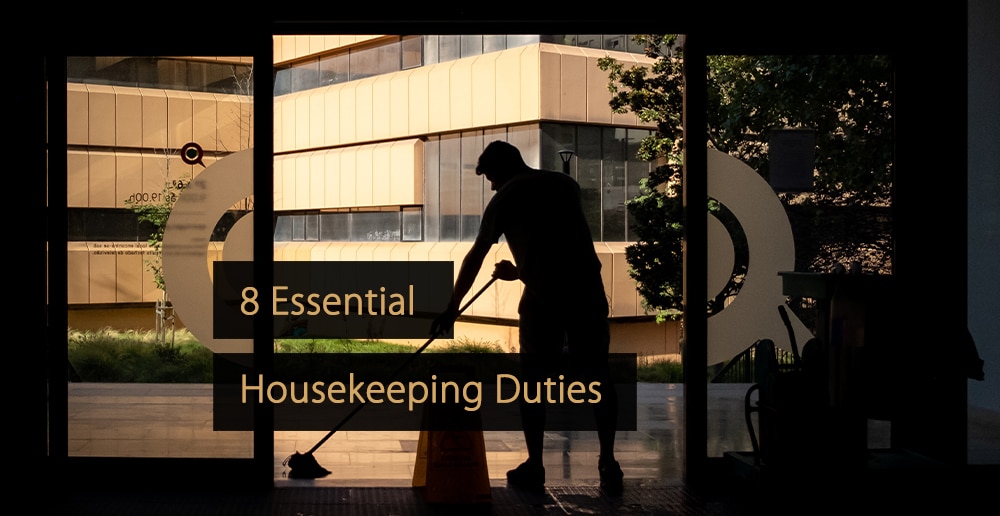Hotel housekeeping is a vital part of any hotel business’s operation; therefore, knowing the housekeeping duties is essential. The housekeeping department ensures guests can enjoy a clean, sanitary, and aesthetically appealing space when they come to stay. In this article, you’ll learn all about the functions and duties of the hotel housekeeping department, what jobs are part of housekeeping, and how you can run your housekeeping department more effectively.
Table of Contents:
- What Is Hotel Housekeeping?
- Importance of Hotel Housekeeping & Housekeeping Duties
- The Housekeeping Trolley: The Ultimate Accessory of the Housekeeper
- 8 Essential Hotel Housekeeping Duties
- What Are the Requirements for a Hotel Housekeeper?
- Housekeeping Technology
- What Does a Room Attendant Do?
- Tips for a Cleaner, Brighter Hotel
What Is Hotel Housekeeping?
Offering guests a comfortable stay in clean and attractive surroundings at an appropriate price point, is the main aim of any business in the hotel industry. Ensuring your hotel offers welcoming surroundings is the principal duty of your housekeeping department. No matter how friendly your staff or glamorous your premises may be, guests need to walk into their room and find everything tidy, spotlessly clean, and thoughtfully arranged. No guest wants to pay to stay at a hotel where the accommodation is grubby or sloppily organized.
It’s in your interest to ensure high standards of cleanliness and orderliness to ensure positive reviews and plenty of repeat business. While this is mainly the housekeeping role, every staff member should be involved. In the kitchens, the chef is responsible for ensuring that everything is clean and orderly; in the restaurant, it’s the head waiter or manager.
Importance of Hotel Housekeeping & Housekeeping Duties
Why is hotel housekeeping so important? The room attendant is vital in creating the impression your customers will take away. A poorly clean room creates an immediate negative impression, which will be reinforced if essentials aren’t restocked at appropriate intervals. They probably won’t be back — they may even share their poor opinion of the hotel through reviews or social media posts.
Conversely, if a room attendant provides excellent service, this will likely be reflected in the customer’s opinion of the hotel. Attention to detail, promptness, and a willingness to go above and beyond will help to cement a positive impression.
The Housekeeping Trolley: The Ultimate Accessory of the Housekeeper
The housekeeping trolley needs to be stocked effectively. On the one hand, staff should not run out of supplies during their shifts, like trips to the stock-room use up valuable time. On the other hand, an overloaded trolley can be hard or even dangerous to push. A good solution is for housekeeping staff to stock their trolleys twice per shift. By stocking the trolley first at the beginning of the shift and then again halfway through (maybe as staff returns from a break), staff can ensure they have everything they need without making it too heavy.
Trolleys should also be organized to optimize efficiency. For example, towels, bedding, and paper products should be placed on the bottom of the cart, with amenities and refreshments near the top. Staff should separate soiled laundry into a bag to avoid confusing clean items.
8 Essential Hotel Housekeeping Duties
The hotel housekeeping duties stack a long list, and sometimes, it can be hard to prioritize. These eight core responsibilities should always come first.
1. Executive Housekeeper Management Duties
The executive housekeeper oversees general cleaning and maintaining the hotel’s aesthetic. They report to the General Manager, the Resident Manager, or the Rooms Division Manager. Executive housekeeper duties include the day-to-day organization, supervision, and coordination of the housekeeping staff; ensuring that sanitation, safety, comfort, and visual appeal are all excellent. Supervising conduct and discipline among staff, and maintaining good communication within the department, are also vital.
Executive housekeepers are also responsible for recruiting and training new personnel, advising and motivating staff, and evaluating staff performance. The executive housekeeper will also be establishing, developing and upholding operating procedures; maintaining inventory and checking furniture, bedding, equipment, and uniforms; managing supplies; checking reports, files, and records held by the department; and providing budgets to management.
2. Management & Coordination of the Department
Management and coordination are the main hubs of the housekeeping department. In some hotels (especially smaller ones) some of the work is undertaken by the front office department. Generally, though, management and coordination work with the housekeeping department and share many of the same responsibilities. Duties include obtaining and sharing room information with the front office, and receiving and relaying complaints regarding housekeeping or maintenance.
Additional housekeeping duties are taking guests’ special requests and ensuring they’re fulfilled, as well as maintaining and updating reports on room status, occupancy, etc. Housekeepers are also expected to delegate work to supervisors and attendants, issue keys, and maintain the key register.
3. Hotel Room Cleaning
Room attendants generally start the day by reviewing charts to determine which rooms are empty and need cleaning. For occupied rooms, the room attendant needs to knock and find out if the guests are present and if they need housekeeping. Later, following checkout time, room attendants will visit newly vacated rooms and begin preparing them for the next guests.
Room attendants need to be reliable, conscientious, and detail-oriented. More importantly, they need to be highly trustworthy. Room attendants will be working where they can access guests’ belongings (jewelry, watches, cash, etc) and sometimes valuable hotel property.
4. Quality Control
One of the main housekeeping duties is quality control. One of the duties of a room attendant is to take note of any broken items and report them to the front desk or maintenance. Because room attendants are often the first people in a position to inspect locations and items that might need repairs or replacements, they must be able to communicate quickly and effectively with the maintenance department.
Room attendants should strive to maximize efficiency while ensuring guests are comfortable and their stay is trouble-free.
5. Cleaning of Hotel Public Spaces
Housekeeping duties don’t just include cleaning private guest rooms. They also include making sure that public areas are clean and well-maintained. These include the lobby, bar, restaurant and spaces such as hallways. Even the car park reflects on your hotel. All public spaces and functional areas must be kept clean.
Maintenance jobs should be reported to the relevant department and attended to promptly. Spaces like conference rooms and banquet halls need to be clean and ready to be used by the next client. Any floral arrangements must be placed where they’ll be most appreciated and replaced regularly.
6. Laundry
Clean towels and linens say so much about a hotel. The laundry room is an essential element of the main housekeeping duties. Cloths and other cleaning equipment must also be washed. As well as using the laundry, room attendants are responsible for helping to keep it clean and tidy, and reporting any maintenance issues.
The laundry is responsible for the entire hotel’s linens. After checking, soiled linen is sent to the laundry. Clean linen is checked again before being ironed. Clean, ironed linen is then distributed to the various departments. A register of linen is kept, and requirements are given to executive housekeepers.
7. Representing Hotel Culture to Guests
Housekeepers are public-facing staff, frequently interacting with guests during their working days. Therefore, part of their job is to represent the hotel culture to visitors. Staff must be polite, friendly, and ready to help guests with questions or requests.
Good communication skills and a working knowledge of policies and amenities will be very helpful, as housekeeping staff may be called upon to assist guests. Being able to help guests right away will create a much better impression than simply sending them to the front desk or another staff member.
8. Tending the Flowers Around the Hotel
Floral arrangements and potted plants create an atmosphere of calm and luxury in any hotel. Some hotels purchase their flowers from florists, while others have a horticulturist on staff. The horticulturist typically reports to the assistant housekeeper, as it becomes one of the housekeeping duties. They will also lead the gardening and landscaping team, tasked with keeping the hotel’s grounds looking beautiful and the upkeep of nurseries or greenhouses.
If the hotel grows its flowers and foliage, these should be collected daily and used in floral arrangements. Different arrangements should be prepared for different spaces within the hotel. They should be maintained with regular water changes, removing damaged or wilted elements, etc.
What Are the Requirements for a Hotel Housekeeper?
Hotel trends come and go, but a good hotel housekeeper always has certain key traits. This role calls for someone who is trustworthy, reliable and has a sense of responsibility. A hotel housekeeper must also be flexible, detail-oriented, and have excellent time management skills.
The job requires a degree of physical fitness as it is very active, involving lots of standing, walking, kneeling, squatting, and bending. Hotel housekeepers typically need at least a high school diploma and must demonstrate extensive experience in the field. Hotel housekeepers need to be self-starters and able to work under pressure without supervision.
Housekeeping Technology
Hotel technology plays an increasingly important role in modern lodging businesses. New innovations in software and computerization can help streamline the housekeeping department’s work, while automation can free up staff for more important tasks. New, more sustainable cleaning products help today’s housekeeping departments do their part for the environment.
From housekeeping software to keep track of all the departmental housekeeping duties to robotic vacuum-cleaners, from air purifiers to AI, “Housekeeping Technology: The Latest Tech used in Hotel Housekeeping” will update you on the latest trends in housekeeping tech.
What Does a Room Attendant Do?
As discussed in the above article, room attendants play a vital role in any hotel business. Whether you’re planning to hire new staff or looking for a room attendant position, this article is for you. In “Room Attendant Guide: Meaning, Job Description, Duties & Technology”, you’ll learn about the duties of a room attendant and why they’re so important.
You’ll find out what personal qualities are important for the job, what kind of experience will be most helpful, and how you can develop your skills. You’ll also learn about the equipment and new technology to help room attendants in today’s workplace.
Tips for a Cleaner, Brighter Hotel
Keeping a whole hotel sparkling from the lobby to the penthouse. Ensuring that everything is maintained perfectly takes time, effort, and skill. In “Hotel Housekeeping Guide: 11 Tips & Tricks to Clean Your Hotel”, you’ll discover some crucial hints and ideas for staying on top of this difficult work.
You’ll learn how to arrange rooms for maximum guest appeal, keep surfaces spotless, and ensure that every guest enjoys their stay. You’ll discover the secrets of organizing a housekeeping trolley and how to use your hotel’s PMS to make life easier.
A clean and tidy hotel has never been more important in today’s health and hygiene-conscious market. Seeing clean, well-maintained facilities will give your guests peace of mind. The housekeeping department has a crucial role in ensuring guests’ confidence.
Would you Like to Learn More About Housekeeping?
You might also be interested in the following articles:
- Housekeeping Department in Hotel Businesses: Why Is It So Important?
- Housekeeping Responsibilities: Learn About the Hotel Cleaning Tasks
- Discover The Latest Housekeeping Trends
- Hotel Room Maintenance Checklist: Ensuring Comfort and Quality
More Tips to Grow Your Business
Revfine.com is the leading knowledge platform for the hospitality and travel industry. Professionals use our insights, strategies, and actionable tips to get inspired, optimize revenue, innovate processes, and improve customer experience.Explore expert advice on management, marketing, revenue management, operations, software, and technology in our dedicated Hotel, Hospitality, and Travel & Tourism categories.
This article is written by:
Hi, I am Martijn Barten, founder of Revfine.com. With 20 years of experience in the hospitality industry, I specialize in optimizing revenue by combining revenue management with marketing strategies. I have successfully developed, implemented, and managed revenue management and marketing strategies for individual properties and multi-property portfolios.









Leave A Comment